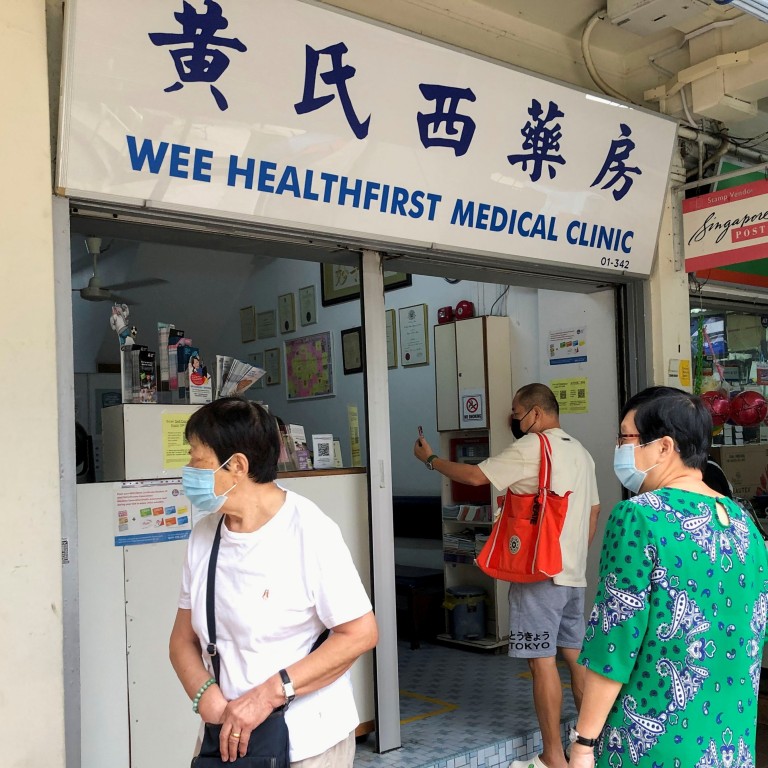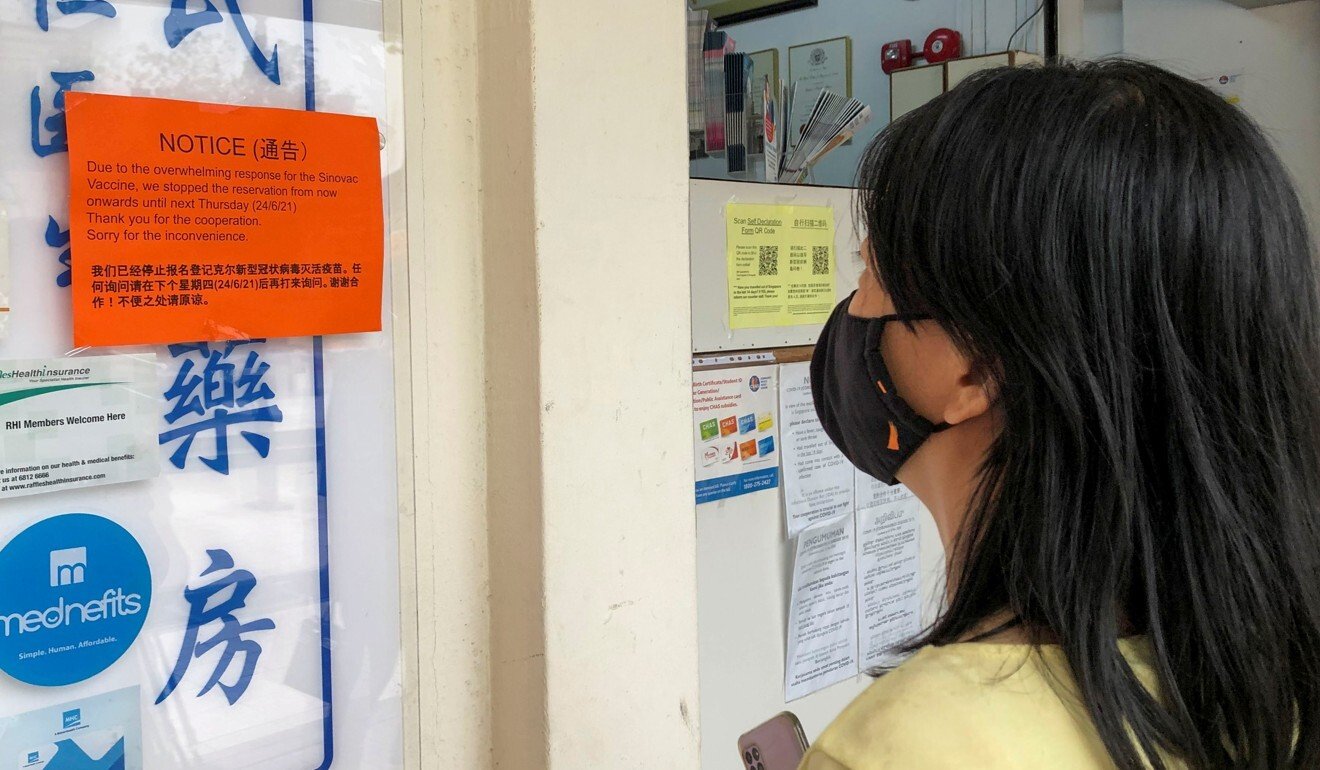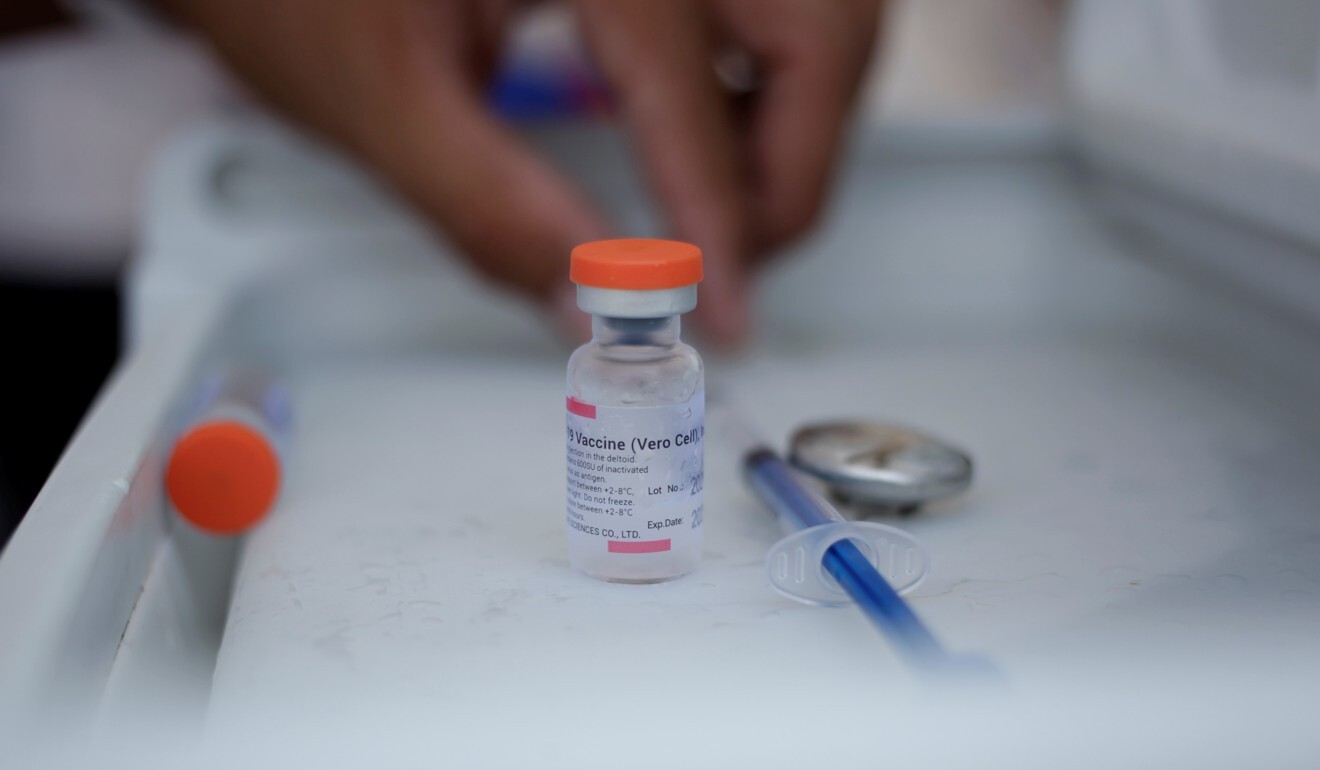
Singaporeans, Chinese nationals queue up for Sinovac vaccine, despite regulators’ concerns over efficacy
- Sinovac has yet to be approved but Singaporeans rushed to private clinics for it, regardless of efficacy questions and ‘significant risk’ of vaccine breakthrough
- The interest also came after the Chinese embassy held a meeting with local businesspeople and as Chinese nationals expressed more trust in Sinovac
Sun Yan Hui, a 50-year-old Harbin native, was one of them. She had taken a day off work just to queue for the vaccine as she expected it would be in high demand.
“I am from China and I love my country. Of course I will take the Sinovac vaccine,” she said in Mandarin.
Singapore looks to live with Covid-19 as endemic
Another mainlander in the queue who did not want to be named said she trusted Chinese jabs more as they have been used by more than a billion people in China. “My entire family and village have taken them and they did not experience any side effects,” said the 32-year-old from the southern Hunan province.
Last Wednesday, Singapore authorities released a list of 24 private health care institutions that could administer the 200,000 Sinovac doses that had arrived in the country in February.
While Sinovac has yet to be granted regulatory approval for use in the city state, the government is now allowing people to choose alternative vaccines to the Pfizer-BioNTech and Moderna ones that have been approved.
Residents who opt for the Chinese shots have to pay a small administrative fee – ranging from S$10-25 (US$7.42-18.57) – and will be excluded from the country’s compensation scheme if they suffer serious side effects or death.
Even so, the Sinovac vaccine appears to be a big hit among residents in the majority-Chinese country. The phone lines of all the approved clinics were constantly engaged when This Week In Asia called on multiple occasions.

Leong Hoe Nam, an infectious diseases expert at the Rophi Clinic, said calls started to flood in an hour after the 10.30pm announcement last Wednesday.
His clinic has been licensed to give the jabs and was allocated 200 doses but more than 1,000 people are on the waiting list. “The response was extremely overwhelming,” he said.
Asked why the clinic applied to administer the Sinovac shots despite the low profit margins, he said: “I have been pro-vaccination all my life. As long as I can get people vaccinated, I am happy.”
The Chinese-made jabs, he added, would cater to people who were against mRNA vaccines because they feared the new technology used, compared to the more traditional ones, like Sinovac, which involve an inactivated virus.
Should Hong Kong and Singapore relent from virus rules to retain foreign talent?
At StarMed Specialist Centre, more than 100 people have received their Sinovac shots, according to its chief executive Louis Tan. The clinic has been given 400 doses so far and already has over 3,000 bookings that would stretch until September.
Tan said that while the initial surge was from residents aged above 40, he also observed a “large number” of Chinese students on long-term visit passes making such enquiries. The clinic planned to place regular orders for the Chinese vaccine.
There is a significant risk of vaccine breakthrough
Over at the Rophi Clinic in downtown Singapore, among the first people to take the jab on Friday was Ng Thin Onn, an 80-year-old Singaporean family doctor. He said he had registered immediately after news broke that residents could take them.
“I prefer and have more faith in the old system of inactivated virus,” he said, likening the Sinovac vaccine to the common flu shots that he takes every six months. “This mRNA [vaccine] is something very new. I am not saying that it is bad but I think there are too many imponderables.”
Ng said he believed in “real world results” instead of scientific trials and peer reviews, which have shown that Sinovac has a lower efficacy rate – about 51 per cent – compared to those produced by Pfizer and Moderna, which both have a rate of above 90 per cent.
“If you look at the results from China, I think they have done better than any one of the other countries,” he said.
‘SIGNIFICANT RISK’
Singapore’s health officials, however, on Friday stressed that they were “unfortunately” still unable to approve the China-made shots as there was still data that the manufacturer has to submit to local regulators.
The city state has also been observing the experiences of other countries that have inoculated a larger proportion of their population with the Sinovac vaccine including Indonesia, said Kenneth Mak, the health ministry’s director of medical services.
“There is a significant risk of vaccine breakthrough,” he told reporters. “It’s not a problem associated with Pfizer. This is actually a problem associated with the Sinovac vaccine, and in other countries, they are now starting to think about booster vaccinations, even six months out from an original vaccination for some of these vaccines as well.”
Singapore, he added, was happy and confident with the two-shot Pfizer-BioNTech and Moderna vaccines it uses. Health Minister Ong Ye Kung over the weekend stated that over half of Singapore’s 5.7 million population have received at least one dose of the vaccine – the first Southeast Asian country to pass this mark – and about 36 per cent have been fully inoculated.
Singapore sequencing finds delta variant is major local Covid-19 strain
Singapore and Vietnam are the only two Southeast Asian countries that have not used the Sinovac vaccine, with the latter recently approving China’s Sinopharm jabs for emergency use.
Countries around the world, including those in Latin America, have been relying on Chinese-made jabs, even though there have been concerns about their efficacy. Costa Rican authorities, for example, on Wednesday rejected the delivery of Sinovac vaccine doses as they felt they were not effective enough.
In Hong Kong, more people are opting for the Pfizer vaccine – at least 1.1 million people have taken their first dose of Pfizer jabs while about 858,000 have received the Sinovac one.

‘BENEFITS’
Meanwhile, the hearty response to the Sinovac vaccine also came after the Chinese embassy in Singapore held a meeting with members of the Zhejiang Entrepreneurs Association on June 12.
As part of the discussion, officials from the Chinese embassy took questions on whether Singaporeans and Chinese nationals in the city state would enjoy “benefits” if they took the Sinovac jabs.
Aaron Yang, vice-president of the association, said hundreds of people attended the virtual meeting. According to Yang, the embassy said there was no “special treatment” on quarantine length at this point, but added that it would be “very convenient” for foreigners who have taken the Sinovac vaccine when applying for a visa.
He pointed to how Singaporeans would typically require an invitation from provincial authorities if they wanted to apply for a business visa to China. This process could be bypassed if they had received Chinese vaccines.
If more people took it in Singapore, China could promote the vaccine to other countries
Alfred Wu, an associate professor at the National University of Singapore (NUS)’s Lee Kuan Yew School of Public Policy, said the outreach was a continuation of China’s vaccine diplomacy, and could be read as a way to get more businesspeople to take the jabs.
“It’s kind of a footprint for them,” he said. “Singapore is a developed economy with a rigorous health care system. If more people took it in Singapore, China could promote the vaccine to other countries.”
But Wu pointed out that it was unlikely there would be any added benefits for now, stressing that China still had strict border controls in place. Travel to the mainland has largely been limited, with only those holding valid work permits or having personal matters to settle allowed to enter.
PROTECTION
Teo Yik Ying, dean of the NUS Saw Swee Hock School of Public Health, suggested that many Chinese nationals would likely opt for Sinovac as it would facilitate their travel back to China when border restrictions ease.
The implication of the positive response would be whether Singapore authorities could ensure an adequate supply of Sinovac vaccines to meet the local demand, he added.
Still, he felt that the long lines for the China jabs was a “good thing” as people are getting vaccinated.
“Sinovac is after all a vaccine that has been approved for the World Health Organization’s emergency use listing, which means the protection conferred by this vaccine is deemed to be sufficiently beneficial for widespread deployment during a public health crisis,” he said.
“So when people come forward to receive the Sinovac vaccine, they are still being protected against Covid-19, and this will all contribute to the overall community defence against the coronavirus.”

